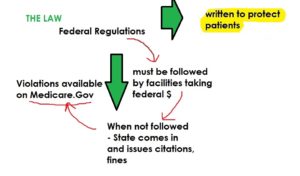I visit nursing homes with some frequency. When I walked into one two weeks ago, I noticed the fake flowers in the entry way. I notice the clean carpet and residents sitting in wheelchairs near the front windows. I didn’t see, and didn’t expect to see a copy of the Federal Code on the coffee table, though the Federal Code (laws created by congress that regulate various businesses, industries, etc. operating in the United States) has allot to say about nursing homes.
Why, you may ask, does the federal code reference nursing homes?
Well, I’m so glad you asked.
When federal dollars (Medicare and Medicaid) are used to pay for health care, the government can require that the healthcare being provided meets certain criteria. And when a facility fails to meet these legal obligations or regulations, and they get caught, they are cited by the State of Virginia and must remedy the violations. These citations are public record and available on www.medicare.gov so folks like you and me can research and investigate facilities and their ability to provide basic care in accordance with federal law and regulations.
Sounds like a good system – doesn’t it? Basic rules apply – all facilities must meet them if they want to get Medicare and Medicaid money, and the whole point is to promote and ensure patient safety.
Why, you may ask, is the goal patient safety?
Again, I’m so glad you asked. The goal is patient safety because when we place our loved ones in the care of strangers, we want our loved ones to be cared for, safe, healthy and provided for. We don’t want a system lacking in accountability where care is unregulated, uncontrolled and the providers cannot be held accountable. Nor do we want a system where facilities are obligated to do little, and families are left wondering what options they have.
In addition to federal regulations, some states have additional laws and rules that effect the way that care is provided in a nursing home. Many states feel the federal rules don’t go far enough to ensure patient safety, and they enact additional rules facilities must follow to provide care.
For example, in many states, a nursing home must have a certain number of trained nursing assistants, and RNs on site to provide care. Staffing minimums require patient / staff ratios, and exist because the basis assumption is – more staff = better care.
In my home state of Virginia, there is no such staffing minimum required by state law. So, a facility could have 30 acute care patients, and 1 certified nursing assistant during a shift. Ever tried to get one acutely ill person bathed, dressed, fed, toileted, medicated, positioned and monitored? It’s time consuming – I can tell you. Could 1 person possibly do that for 30 people in an 8 hour shift? No, so states have laws that say you need 3 or 4 nurses to do the job.
Unfortunately – we exist in a very polarized political world where people will say they are either PRO REGULATION or PRO BUSINESS.
I am actually pro both – but do see where a number of state and federal laws (or regulations) exist to promote safety and welfare. Do they have the impact of decreasing profits – yup, they sure do, but in the case of nursing homes, these regulations can actually boost employment rates as a facility must hire additional workers to care for patients.
So, without being for or against – I think it is best to ask – What is the point of that regulation? Who does it affect and why? And could safety and welfare of people be important enough that we must have a regulation, even if it cuts from the bottom line?
The answer in long term care is unequivocally YES.
And so while I didn’t see the federal code on the coffee table at the nursing home, I know the staff is aware of their requirements. I only wish Virginia lawmakers were gutsy enough to do more to protect patients in nursing homes, and create additional regulations that required minimum staffing.
So – am I pro regulation or pro business? Yes. Yes I am.

